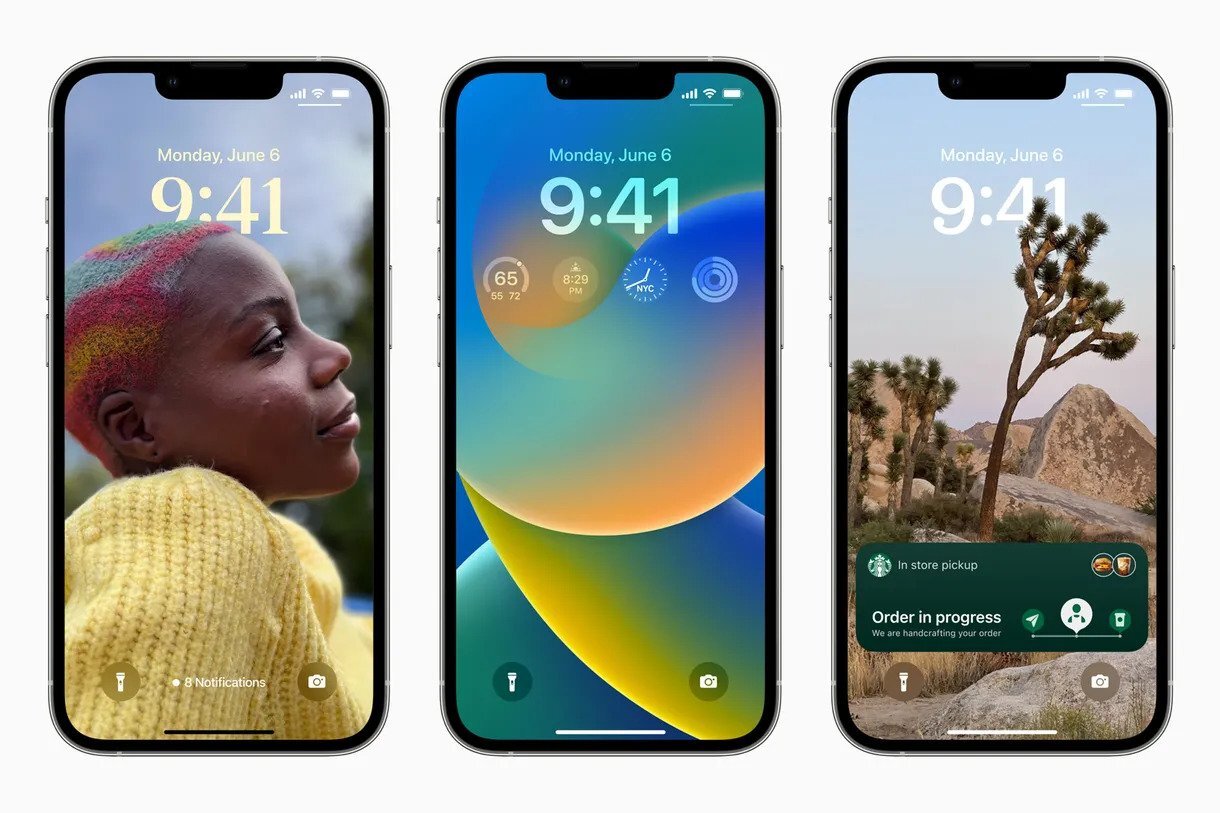
IN PARTNERSHIP WITH

Good morning 🎊
iOS 16 rolls out today. 🚀
From this morning, Apple users will be able to download the latest upgrades for their phones. If you’ve got an iPhone, here’s a list of some of the new changes coming.
A customisable lock screen panel that will allow you change the font and colour of your date and time, add weather widgets, and calendar events. The lock screen will also come with a Live Activities feature that will give you live updates on things like Uber rides and sports events.

iOS 16 will allow you to edit typos out of sent messages, unsend messages, and mark message threads as unread so you can come back to them later. You’ll also be able to filter messages by SIM card. On Mail, you’ll be able to schedule messages, and undo sent messages for up to 30 seconds after sending them.
On Photos, you’ll be able to remove the backgrounds from any photo, and copy and paste changes you made to one photo onto other photos.
Apple Pay Later is also coming with iOS 16. The buy-now-pay-later (BNPL) feature lets you pay in four instalments over six weeks when you use Apple’s payments service, Apple Pay.
Finally, FaceID will work in landscape mode. That means, no twisting and turning or swiping while laying down.
CRYPTO MARKET: FOR QUEEN AND CRYPTO

|

|

|
|---|---|---|
|
Bitcoin 
|
$21, 714 |
+ 0.83% |
|
Ether 
|
$1,728 |
– 1.84% |
|
BNB 
|
$293 |
– 0.41% |
|
Solana 
|
$34.92 |
+ 0.55% |
|
Cardano 
|
$0.50 |
– 1.39% |
|
|
Source: CoinMarketCap
|
|
* Data as of 06:00 AM WAT, September 12, 2022.
The Queen of England may be gone but her name will never be forgotten. And one of the ways people are immortalising Queen Elizabeth? Crypto.
Since her death was announced by Buckingham Palace, per Coin Telegraph, over 40 coins and hundreds of NFTs named after the Queen have flooded several blockchains—Queen Elizabeth Inu, Save the Queen, Queen, QueenDoge, London Bridge is Down, and Rip Queen Elizabeth, to name a few.
And the punch: People are buying into it.
Queen Elizabeth Inu token sold over $200,000 within the first 24 hours, Save the Queen saw over $700,000 in transaction volume while the Elizabeth token saw over $2.7 million in trade volume under 12 hours.
Unfortunately, this crypto high might come crashing down soon. Most of the coins have very little liquidity behind them—there’s no serious financial support. And crypto experts have likened this phase to the Squid Game token—SQUID—where investors lost over $3 million buying coins with no value.
This time, it looks like many may be taking the term “Long Live the Queen” too literally.
Don’t just send money, send money fast. Send and receive money directly to mobile wallets, bank accounts, Barter or through cash pickup with $end.
Visit send.flutterwave.com and do it now!
This is partner content.
CAPITER’S BOARD FIRES FOUNDERS

Egyptian B2B e-commerce startups frequently make news with the mega funding deals they close. Capiter was one of them. Last year, the then 1-year-old startup raised a $33 million series A round to the excitement of its board members.
But last week, those board members unanimously fired the startup’s cofounders, Mahmoud and Ahmed Nouh, citing the brothers’ aloofness from the business and funds mismanagement as core reasons.
Backstory: It didn’t seem like much when Capiter secretly laid off about 100 employees between July and July this year. What people didn’t know was that the company was quietly going broke. According to TechCrunch, Capiter was having problems onboarding new merchants into its platform, its management was super poor, and it barely had operational cash for more than a month left.
These claims began to mirror reality when, in September, exactly when the sources had said the startup would be flat broke, Capiter’s investors began to race towards an exit by selling the business or doing a merger. But such moves required an x-ray into the company’s structure and pocket. The founders needed to be there to ensure the process worked, but according to the investors, that was when the brothers stopped responding to board directors or shareholders.
The investors’ side
In an official press release, Capiter’s board of directors declared that Mahmoud and Ahmed, the CEO and COO of the company, were immediately fired. They also appointed Majid El Ghazouli, Capiter’s CFO, as interim CEO until “the Nouh brothers return and allay the concerns of stakeholders.”
Meanwhile, the CEO, Mahmoud Nouh, yesterday denied that any of this was happening, and maintained that he and his brother had not received any notice of dismissal.
NIGERIAN MAN WANTED BY FBI FOR $31 MILLION CYBER FRAUD

The US Federal Bureau of Investigation (FBI) has declared a Nigerian man wanted for defrauding the state of New York of more than $30 million in wire and mail fraud.
Twenty-one-year-old Chidozie Collins Obasi was charged with one count of conspiracy to commit mail and wire fraud, six counts of mail fraud, and 16 counts of wire fraud.
According to US attorney, Jacqueline C. Romero, all the fraudulent activities committed by Obasi were part of an elaborate scheme targeting Americans during the COVID-19 pandemic in 2020.
Initially starting in October 2018, Obasi and his co-conspirators began sending spam emails offering fake remote jobs to Americans. When they got responses, the instigators would then pose as representatives of legitimate US-based companies—often ones selling medical equipment. As part of their new jobs, the unsuspecting victims would cash fake cheques from supposed customers of the companies, take commissions from the cheques, and send the remnants to foreign bank accounts created by Obasi. Via this scheme, Obasi defrauded banks of $1 million.
At the height of the pandemic when countries were low on ventilators, Obasi allegedly defrauded the state of New York of $30 million by posing as a representative of an Indonesian-based medical supply company offering non-existent ventilators for sale.
In June 2020, the accused also used stolen identities of US citizens to obtain more than $135,000 in EID loan proceeds.
Obasi is presently wanted by the FBI who state that he faces a 621-year maximum prison sentence, a $5,750,000 fine, and restitution of the $31 million he allegedly stole.
Zoom out: Obasi’s case is the latest in a series of COVID-related cyber fraud schemes that have been revealed since 2020 including Babatunde “Teddy” Adesanya and Akinpelu Abbass who were arrested by INTERPOL for their involvement in a €14.7 million ($14.9 million) PPE fraud. Since the pandemic, an estimated $100 billion has been lost to COVID-19-related fraud masterminded by criminals across the globe.
Increase your online sales with a Paystack Storefront – a free, beautiful seller page that helps you bring creative ideas to life.
👉🏾 Learn more at paystack.com/storefront.
This is partner content.
ARE WHATSAPP GROUP ADMINS CULPABLE FOR MEMBERS’ POSTS IN SOUTH AFRICA?

Imagine this: It’s a bright afternoon, but things are not so bright for a young man, Joe. He’s being accused in a South African court. The reason? One of the 512 members in his WhatsApp group said something offensive, and by South African law, the group admin is responsible! Poor Joe, right?
According to a South African lawyer, Emma Sadlier, WhatsApp’s latest update could make group admins legally culpable for anything shared on the groups they administrate. And Sadlier is right.
How does this work?
In June 2021, President Cyril Ramaphosa signed South Africa’s Cybercrimes Act into law; and later in December of the same year, many provisions of the Act were enforced.
The provisions of the Act criminalise cybercrimes like fraud, forgery or unlawful interception—or hacking—and one notable provision, in Part II, creates an offence titled “malicious communications”.
According to Sections 14–16 of the Act, malicious communications are any messages that: invite damage to property or violence, threaten people with damage to property or violence or unlawfully contain an intimate image. This includes messages sent and stored electronically including WhatsApp messages. Anyone convicted of this offence is liable to fining and three years imprisonment.
Now this, naturally, doesn’t concern WhatsApp group admins because the Cybercrimes Act has stated that only the utterer of the malicious communications is culpable.
But South Africa has enacted previous legislations to prevent spreading false information with the intention to deceive. And since public platforms like WhatsApp Groups can be treated as publications like newspapers, the person in control of that publication—the WhatsApp group admins here—will be liable for what is posted on their platforms.
Think of it this way: If a newspaper publishes a defamatory piece, both the newspaper and the writer are guilty. WhatsApp Groups are public spaces with 512 members, and South Africa is trying to hold everyone accountable.
But what can WhatsApp group admins do?
They can monitor texts on the groups and delete the ones that could have them visiting a police station.
The new update—which is slowly being rolled out—gives admins up to two days to delete any message classified as “malicious communications”.
TC INSIGHTS: FIXING AFRICA’S DATA SUPPLY
Stakeholders in the African tech ecosystem are increasingly called on to use data in making decisions, but where can they get the data? Venture capital funding is by far the most aggregated data point on the continent, and even that comes in different shapes and sizes, depending on the source you’re reading from.
For 2019, Partech declared total VC funding at $2 billion, WeeTracker put the number at a $1.3 billion estimate while Disrupt Africa said the continent raised $496 million. That’s an average difference of over $769 million.
Overnight, Nigeria became Africa’s largest economy in 2014 because the model for calculating the GDP wasn’t reviewed ( or “rebased”) for decades, leaving out important sectors like telecommunication, entertainment, and information technology. This means any decision made on the faulty data between the gap years was wrong.

However, having wrong data is just one side of the problem. In fact, it’s the better side. If you wanted to know the market size of the neo-banking segment in Africa today, it’s going to be a hassle and whatever effort you put in to gather the data via secondary research will not be anywhere close to what the real value is.
While it is not mandatory for private companies to publish their business data, understanding our ecosystem deeply will require that they do. The danger of not doing this is that the world will call us whatever they want and we’ll have no choice but to believe because there is no other truth. Perhaps, there’s a business opportunity here for anyone willing to do the dirty work.
The next phase of growth for the African tech ecosystem is dependent on knowing. If we do not know, we cannot act accurately. If what we know isn’t the truth, all plans built on that falsehood will crumble. If we act without knowing, we are bound to miss the mark.
EVENT: FUTURE OF COMMERCE 2022

At the last edition of the Future of Commerce, we looked at all the changes coming to how we buy and sell, exploring trends across four key sectors—fintech, e-commerce, logistics, and mobility.
This year, the conference is targeted at Africa’s informal sector and the focus is on payments, logistics, mobile money, agent networks, informal trade, BNPL, and social commerce—all topics that tug at the heart of the African consumer and the stakeholders serving them.
Ever walked down the street to use a POS machine? Or added your card to streaming services like Netflix or Spotify? Maybe you’ve even used the buy-now-pay-later (BNPL) option to buy a new gadget. These payment trends are taking over, and they’re not slowing down.
On September 23, 2022, at the Future of Commerce, we’ll be talking about these trends and how everyone can leverage them.
Register now to reserve a spot.
The Future of Commerce is brought to you by TechCabal in partnership with Moniepoint, and sponsored by dLocal, Get QoreID and KasuwaGo.
IN OTHER NEWS FROM TECHCABAL
Kippa secures Super-Agent banking licence as it extends ambition to help Nigerian SMEs.
How to build a website for small businesses in five steps.
Meet the 13 Nigerian community leaders fueling Africa’s tech talent pipeline.
Is Y Combinator paying lip service to gender diversity in tech?
Start cashing out your bitcoin for naira today. With Cashout, you can own a bitcoin exchange and start receiving payments with bitcoin. Cashout makes it easy to exchange bitcoin for naira.
Get started today! Cash out with Cashout.
This is partner content.
JOB OPPORTUNITIES
- Big Cabal Media –Head of Events – Lagos, Nigeria
- Big Cabal Media –Reporter, Citizen – Lagos, Nigeria
- Big Cabal Media –Newsletter Editor, Citizen – Lagos, Nigeria
- Big Cabal Media –Multimedia Content Creator, Citizen – Lagos, Nigeria
- Big Cabal Media –Newsletter, Editor, Zikoko – Lagos, Nigeria
What else is happening in tech?
- Is Netflix thinking of ending its binge-watch business model?
- Kenya’s Asset Recovery Agency (ARA) drops money laundering case against three Nigerian companies.
- Three sisters launch low-cost Wi-Fi in townships using South African tech.
- How Africans will remember Queen Elizabeth II.



























